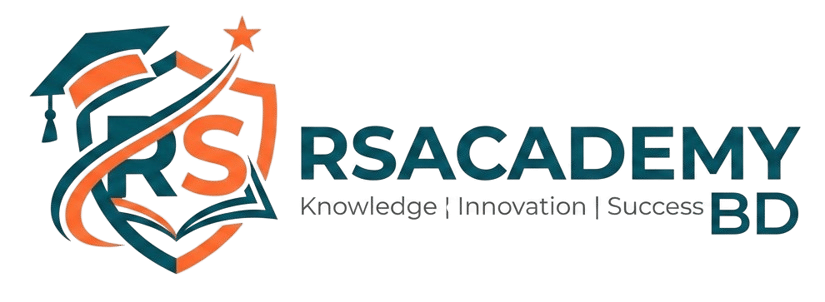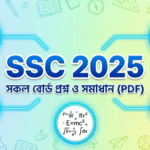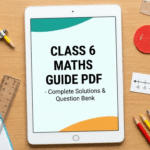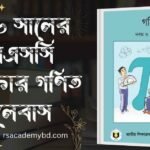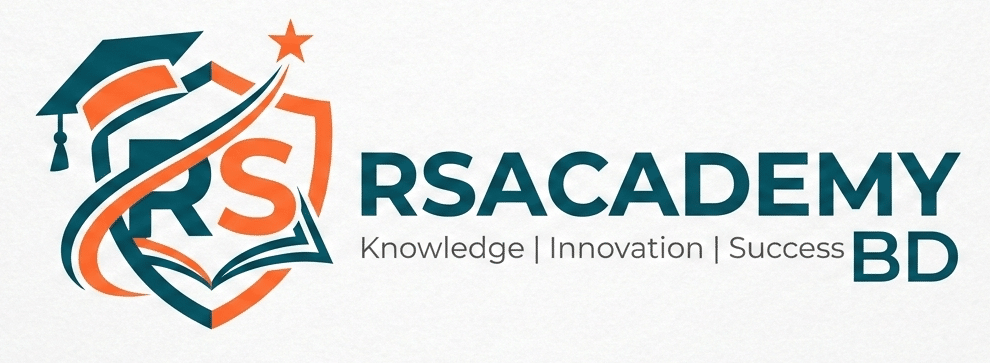SSC 2026 English 2nd Paper Syllabus: সাজেশন
The SSC examination is a crucial milestone for students in 2026, and English 2nd Paper plays a significant role in achieving a good overall result. Following the revised syllabus published by the National Curriculum and Textbook Board (NCTB) is essential for effective preparation. In this blog post, we’ll dive deep into the SSC 2026 English 2nd Paper Syllabus (Subject Code: 108, Full Marks: 100) for SSC candidates of 2026. We’ll also share effective preparation strategies for each section, making it easier for you to ace your exams.
Thank you for reading this post, don't forget to subscribe!(২০২৬ সালের এসএসসি পরীক্ষার্থীদের জন্য এসএসসি পরীক্ষা একটি গুরুত্বপূর্ণ ধাপ, এবং ইংরেজি দ্বিতীয় পত্র সামগ্রিক ফলাফলে একটি উল্লেখযোগ্য ভূমিকা রাখে। জাতীয় শিক্ষাক্রম ও পাঠ্যপুস্তক বোর্ড (NCTB) কর্তৃক প্রকাশিত পুনর্বিন্যাসকৃত পাঠ্যসূচি অনুসরণ করে কার্যকর প্রস্তুতি নেওয়া অপরিহার্য। এই ব্লগ পোস্টে, আমরা ২০২৬ সালের এসএসসি পরীক্ষার্থীদের জন্য ইংরেজি দ্বিতীয় পত্রের (বিষয় কোড: ১০৮, পূর্ণ নম্বর: ১০০) বিস্তারিত সিলেবাস এবং প্রতিটি অংশের জন্য কার্যকর প্রস্তুতি কৌশল নিয়ে আলোচনা করব, যা তোমাদের পরীক্ষায় ভালো করতে সহায়তা করবে।)
SSC 2026 English 2nd Paper Syllabus- Grammar Part
A) Grammar Part: The Foundation of English Language (ব্যাকরণ অংশ: ইংরেজি ভাষার ভিত্তি)
The Grammar part is the most critical section of English 2nd Paper. It ensures correct usage and proper structuring of the English language. A strong grasp of grammar is essential for writing and speaking English accurately.
(ইংরেজি দ্বিতীয় পত্রের সবচেয়ে গুরুত্বপূর্ণ অংশ হলো ব্যাকরণ। এটি ইংরেজি ভাষার সঠিক ব্যবহার এবং কাঠামো নিশ্চিত করে। নির্ভুলভাবে ইংরেজি লিখতে ও বলতে পারার জন্য ব্যাকরণে ভালো দখল থাকা অপরিহার্য।)
- Gap filling activities with clues (prepositions, articles, parts of speech): In this section, you’ll find sentences with blanks that need to be filled with appropriate words, with some clues provided. These clues often relate to prepositions (e.g., in, on, at), articles (a, an, the), and various parts of speech (e.g., nouns, verbs, adjectives). Understanding the context and the function of these words is key. (এই অংশে, শূন্যস্থান সহ বাক্য দেওয়া থাকবে যা উপযুক্ত শব্দ দিয়ে পূরণ করতে হবে, এবং কিছু সূত্রও দেওয়া থাকবে। এই সূত্রগুলো প্রায়শই Prepositions (যেমন: in, on, at), Articles (a, an, the), এবং বিভিন্ন Parts of Speech (যেমন: Noun, Verb, Adjective) এর সাথে সম্পর্কিত। বাক্যটির প্রেক্ষাপট এবং এই শব্দগুলোর কার্যকারিতা বোঝা জরুরি।)
- Gap filling activities without clues (prepositions, articles, parts of speech): Similar to the above, but without any clues. This tests your in-depth knowledge and intuition about using prepositions, articles, and other parts of speech correctly in various contexts. (আগেরটার মতোই, তবে কোনো সূত্র ছাড়াই। এটি Preposition, Article এবং Parts of Speech ব্যবহারের ক্ষেত্রে তোমার গভীর জ্ঞান ও স্বজ্ঞাকে পরীক্ষা করে।)
- Right forms of verbs: This section focuses on using the correct tense and form of verbs in sentences. It requires a good understanding of tenses, subject-verb agreement, and various verb forms (e.g., base form, past simple, past participle, -ing form). (এই অংশটি বাক্যে ক্রিয়ার সঠিক Tense এবং Form ব্যবহার করার উপর দৃষ্টি নিবদ্ধ করে। এটি Tense, Subject-Verb Agreement এবং বিভিন্ন Verb Form (যেমন: Base Form, Past Simple, Past Participle, -ing Form) সম্পর্কে ভালো ধারণা থাকা দাবি করে।)
- Changing sentences (voice, sentence type, degree, affirmative to negative, etc.): This is a crucial transformation part. You’ll need to change sentences according to specific instructions. This includes:
- Voice Change (Active to Passive and vice versa)
- Sentence Type Change (Assertive, Interrogative, Imperative, Optative, Exclamatory)
- Degree Change (Positive, Comparative, Superlative)
- Affirmative to Negative (and vice versa)
- Simple, Complex, Compound sentence transformations. Understanding the rules for each transformation is vital. (এটি একটি গুরুত্বপূর্ণ বাক্য রূপান্তর অংশ। নির্দিষ্ট নির্দেশনা অনুযায়ী তোমাকে বাক্য পরিবর্তন করতে হবে। এর মধ্যে রয়েছে: Voice Change (Active থেকে Passive এবং উল্টো), Sentence Type Change (Assertive, Interrogative, Imperative, Optative, Exclamatory), Degree Change (Positive, Comparative, Superlative), Affirmative থেকে Negative (এবং উল্টো), এবং Simple, Complex, Compound বাক্যের রূপান্তর। প্রতিটি রূপান্তরের নিয়ম বোঝা অত্যন্ত গুরুত্বপূর্ণ।)
- Completing sentences: You’ll be given incomplete sentences, and you need to complete them meaningfully and grammatically correctly. This often tests your knowledge of conditional sentences, phrases, clauses, and common idioms. (অসম্পূর্ণ বাক্য দেওয়া থাকবে এবং তোমাকে সেগুলোকে অর্থপূর্ণ ও ব্যাকরণগতভাবে সঠিক করে সম্পূর্ণ করতে হবে। এটি প্রায়শই তোমার Conditional Sentences, Phrases, Clauses এবং সাধারণ Idioms সম্পর্কে জ্ঞানকে পরীক্ষা করে।)
- Suffixes and Prefixes: This section deals with adding suffixes (e.g., -tion, -ment, -able) and prefixes (e.g., un-, dis-, re-) to root words to form new words and change their meaning or part of speech. (এই অংশটি Suffixes (যেমন: -tion, -ment, -able) এবং Prefixes (যেমন: un-, dis-, re-) যোগ করে নতুন শব্দ গঠন এবং তাদের অর্থ বা Parts of Speech পরিবর্তন নিয়ে কাজ করে।)
- Tag questions: You’ll learn how to add a short question (tag) at the end of a statement to ask for confirmation. For example, “You are a student, aren’t you?” Understanding the auxiliary verb and subject agreement is crucial. (একটি বাক্যের শেষে একটি সংক্ষিপ্ত প্রশ্ন (Tag) যোগ করে নিশ্চিতকরণ চাওয়াকে Tag Question বলে। উদাহরণস্বরূপ: “You are a student, aren’t you?” (তুমি একজন ছাত্র, তাই না?) Auxiliary Verb এবং Subject-এর মধ্যে সঙ্গতি বোঝা গুরুত্বপূর্ণ।)
- Sentence Connectors: This involves using words or phrases (e.g., however, therefore, in addition, moreover) to link ideas, sentences, or paragraphs smoothly. It enhances the coherence and flow of your writing. (এটি ধারণা, বাক্য বা অনুচ্ছেদগুলিকে মসৃণভাবে সংযুক্ত করতে শব্দ বা বাক্যাংশ (যেমন: however, therefore, in addition, moreover) ব্যবহার করাকে বোঝায়। এটি তোমার লেখার ধারাবাহিকতা ও প্রবাহ বাড়ায়।)
- Punctuation: Correct use of punctuation marks (e.g., commas, periods, semicolons, quotation marks, apostrophes, dashes) is vital for clarity and readability in writing. (লেখায় স্পষ্টতা এবং পঠনযোগ্যতার জন্য বিরামচিহ্ন (যেমন: কমা, পিরিয়ড, সেমিকোলন, উদ্ধৃতি চিহ্ন, অ্যাপোস্ট্রোফি, ড্যাশ) এর সঠিক ব্যবহার অপরিহার্য।)
Preparation Strategy (Grammar Part): Understand each grammar rule with examples, rather than just memorizing them. Practice extensively from grammar books and previous year’s question papers. Identify your weak areas and work on them consistently. Regular practice is the key to mastering this section.
(প্রস্তুতি কৌশল (ব্যাকরণ অংশ): প্রতিটি ব্যাকরণ নিয়ম শুধু মুখস্থ না করে, উদাহরণ সহ বুঝে বুঝে অনুশীলন করো। ব্যাকরণ বই এবং বিগত বছরের প্রশ্নপত্র থেকে প্রচুর পরিমাণে অনুশীলন করো। তোমার দুর্বল ক্ষেত্রগুলো চিহ্নিত করো এবং সেগুলোর উপর নিয়মিত কাজ করো। নিয়মিত অনুশীলনই এই অংশ আয়ত্ত করার মূল চাবিকাঠি।)
SSC 2026 English 2nd Paper Syllabus- Writing Part
B) Writing Part: Expressing Your Ideas Effectively (নির্মিতি অংশ: তোমার ধারণা কার্যকরভাবে প্রকাশ)
The Writing part assesses your ability to express ideas clearly, creatively, and in a well-structured manner in English. A good command of vocabulary and sentence structure is vital here.
(রাইটিং অংশটি ইংরেজিতে তোমার ধারণা স্পষ্টভাবে, সৃজনশীলভাবে এবং সুসংগঠিতভাবে প্রকাশ করার ক্ষমতা মূল্যায়ন করে। এখানে শব্দভান্ডার এবং বাক্য গঠনে ভালো দখল থাকা অত্যাবশ্যক।)
- CV with Cover Letter: You’ll need to prepare a Curriculum Vitae (CV) along with a Cover Letter for a job application. The CV should highlight your educational qualifications, skills, and experience, while the cover letter should introduce you and express your interest in the position. Both require a formal and precise language. (চাকরির আবেদনের জন্য তোমাকে একটি Curriculum Vitae (CV) এর সাথে একটি Cover Letter তৈরি করতে হবে। CV-তে তোমার শিক্ষাগত যোগ্যতা, দক্ষতা এবং অভিজ্ঞতা তুলে ধরতে হবে, আর Cover Letter-এ নিজেকে পরিচয় করিয়ে পদের প্রতি তোমার আগ্রহ প্রকাশ করতে হবে। উভয় ক্ষেত্রেই আনুষ্ঠানিক এবং সুনির্দিষ্ট ভাষা প্রয়োজন।)
- Formal Letter (Application/Complaint Letter): This involves writing formal letters for official purposes.
- Application Letter: For various official requests (e.g., seeking leave, applying for a certificate, requesting information) addressed to the headmaster, principal, or any authority.
- Complaint Letter: To officially register a grievance or problem to the concerned authority. Formal letters follow a specific format and require polite, clear, and concise language. (এটি আনুষ্ঠানিক উদ্দেশ্যে দাপ্তরিক চিঠি লেখা জড়িত।
- Application Letter (আবেদনপত্র): বিভিন্ন আনুষ্ঠানিক অনুরোধের জন্য (যেমন: ছুটি চাওয়া, প্রশংসাপত্রের জন্য আবেদন, তথ্য চাওয়া) প্রধান শিক্ষক, অধ্যক্ষ বা অন্য কোনো কর্তৃপক্ষের কাছে লেখা হয়।
- Complaint Letter (অভিযোগপত্র): সংশ্লিষ্ট কর্তৃপক্ষের কাছে কোনো অভিযোগ বা সমস্যার বিষয়ে আনুষ্ঠানিকভাবে জানানো। আনুষ্ঠানিক চিঠিগুলো একটি নির্দিষ্ট বিন্যাস অনুসরণ করে এবং মার্জিত, স্পষ্ট ও সংক্ষিপ্ত ভাষা প্রয়োজন।)
- Paragraph Writing: You’ll write a paragraph on a given topic. A good paragraph typically has a topic sentence, supporting sentences that elaborate on the main idea, and a concluding sentence. Practice different types of paragraphs (descriptive, narrative, argumentative). (একটি নির্দিষ্ট বিষয়ের উপর একটি অনুচ্ছেদ লিখতে হবে। একটি ভালো অনুচ্ছেদে সাধারণত একটি Topic Sentence, মূল ধারণাটিকে ব্যাখ্যা করার জন্য Supporting Sentences এবং একটি Concluding Sentence থাকে। বিভিন্ন ধরণের অনুচ্ছেদ (বর্ণনামূলক, বর্ণনামূলক, যুক্তিমূলক) লেখার অনুশীলন করো।)
- Composition (Essay Writing): This is a longer piece of writing where you discuss a topic in detail. A well-structured composition includes an introduction, body paragraphs (each focusing on a specific aspect of the topic), and a conclusion. It assesses your depth of knowledge, analytical skills, and ability to present arguments logically. (এটি একটি দীর্ঘ লেখা যেখানে তুমি একটি বিষয় বিস্তারিতভাবে আলোচনা করবে। একটি সুসংগঠিত Composition-এ একটি ভূমিকা, মূল অংশ (প্রতিটি একটি নির্দিষ্ট দিক নিয়ে আলোচনা করে) এবং একটি উপসংহার থাকে। এটি তোমার জ্ঞানের গভীরতা, বিশ্লেষণাত্মক দক্ষতা এবং যুক্তিযুক্তভাবে যুক্তি উপস্থাপন করার ক্ষমতা মূল্যায়ন করে।)
Preparation Strategy (Writing Part): Practice writing regularly. Learn the formats for different types of letters, CVs, and compositions. Expand your vocabulary and practice using appropriate sentence structures. Reading widely can also improve your writing style and ideas. Pay attention to grammar and spelling while writing.
(প্রস্তুতি কৌশল (নির্মিতি অংশ): নিয়মিত লেখার অনুশীলন করো। বিভিন্ন ধরণের চিঠি, CV এবং Composition-এর ফরম্যাট শিখো। তোমার শব্দভান্ডার বাড়াও এবং উপযুক্ত বাক্য কাঠামো ব্যবহার করার অনুশীলন করো। বেশি বেশি পড়াশোনাও তোমার লেখার শৈলী এবং ধারণাকে উন্নত করতে পারে। লেখার সময় ব্যাকরণ এবং বানান এর দিকে মনোযোগ দাও।)
In Conclusion (পরিশেষে):
For SSC 2026 English 2nd Paper Syllabus is a critical subject that offers significant opportunities to score well. A strong command of grammar combined with the ability to write clearly and effectively will lead to success. Study each chapter of your textbook diligently, practice grammar rules consistently, and develop a habit of regular writing practice. By managing your time effectively and focusing on your weaker areas, you will undoubtedly achieve your desired results.
(২০২৬ সালের এসএসসি পরীক্ষার্থীদের জন্য ইংরেজি দ্বিতীয় পত্র একটি গুরুত্বপূর্ণ বিষয়, যেখানে ভালো নম্বর তোলার ব্যাপক সুযোগ রয়েছে। ব্যাকরণে দৃঢ় দখল এবং পরিষ্কার ও কার্যকরভাবে লেখার দক্ষতা—এই দুইয়ের সমন্বয়ই তোমাকে সাফল্যের শিখরে নিয়ে যেতে পারে। তোমার পাঠ্যবইয়ের প্রতিটি অধ্যায় মনোযোগ সহকারে পড়ো, ব্যাকরণ নিয়মগুলো নিয়মিত অনুশীলন করো এবং নিয়মিত লেখার অভ্যাস গড়ে তোলো। তোমার সময় কার্যকরভাবে ব্যবস্থাপনা করে এবং তোমার দুর্বল ক্ষেত্রগুলোতে মনোযোগ দিয়ে প্রস্তুতি নিলে তুমি নিঃসন্দেহে তোমার কাঙ্ক্ষিত ফলাফল অর্জন করতে পারবে।)
Best of luck with your preparation! (তোমার প্রস্তুতির জন্য অনেক শুভকামনা!)
তোমার প্রস্তুতির জন্য অনেক শুভকামনা!
যদি কোন মন্তব্য বা মতামত থাকে তবে সেই বিষয় উল্লেখ করে সাবমিট করতে পারো।
